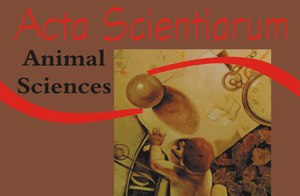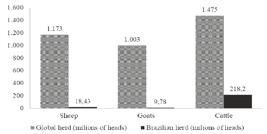| Emission (kg CH4 year-1) |
BW (kg) |
Local |
Source |
| Non Dairy Goats |
| 5 |
40 |
Global |
IPCC (2006)Intergovernamental Panel on Climate Change [IPCC]. (2006). IPCC guidelines for national greenhouse gas inventories. Kanagawa, JP: Institute for Global Environmental Strategies.
|
| 6.8 |
34 |
USA |
Animut et al. (2008Animut, G., Puchala, R., Goetsch, A. L., Patra, A. K., Sahlu, T., Varel, V. H., & Wells, J. (2008). Methane emission by goats consuming diets with different levels of condensed tannins from lespedeza. Animal Feed Science and Technology, 144(3-4), 212-227. doi: 10.1016/j.anifeedsci.2007.10.014
https://doi.org/10.1016/j.anifeedsci.200...
) |
| 3 |
25 |
Africa |
Herrero, Thornton, Kruska, and Reid (2008Herrero, M., Thornton, P. K., Kruska, R., & Reid, R. S. (2008). Systems dynamics and the spatial distribution of methane emissions from African domestic ruminants to 2030. Agriculture, Ecosystems & Environment, 126(1-2), 122-137. ) |
| 9 |
40 |
New Zealand |
MAF (2012)Ministry of Agriculture and Forestry [MAF]. (2012). Methane emissions and nitrogen excretion rates for New Zealand goats. Wellington, NZ: MAF.
|
| 6.2 |
24 |
China |
Yang, Mao, Long, and Zhu (2012Yang, C. J., Mao, S. Y., Long, L. M., & Zhu, W. Y. (2012). Effect of disodium fumarate on microbial abundance, ruminal fermentation and methane emission in goats under different forage: concentrate ratios. Animal, 6(11), 1788-1794. ) |
| 5 |
45 |
South Korea |
Jeong et al. (2012Jeong, W. Y., Yi, O. H., Choi, H. J., Nam, K. T., Kim, B. G., & Lee, S. R. (2012). Effects of dietary vegetable oils on intake, digestibility and methane emission from black goats. Journal of Animal and Veterinary Advances, 11(24), 4689-4692. ) |
| 5.8 |
34 |
Japan |
Bhatta et al. (2013Bhatta, R., Enishi, O., Yabumoto, Y., Nonaka, I., Takusari, N., Higuchi, K., … Kurihara, M. (2013). Methane reduction and energy partitioning in goats fed two concentrations of tannin from Mimosa spp. The Journal of Agricultural Science, 151(1), 119-128. ) |
| 5.6 |
34 |
India |
Miri, Tyagi, Ebrahimi, and Mohini (2013Miri, V. H., Tyagi, A. K., Ebrahimi, S. H., & Mohini, M. (2013). Effect of cumin (Cuminum cyminum) seed extract on milk fatty acid profile and methane emission in lactating goat. Small Ruminant Research, 113(1), 66-72. ) |
| 4.6 |
45 |
Denmark |
Nielsen, Kiani, Tejada, Chwalibog, and Alstrup (2014Nielsen, M. O., Kiani, A. l., Tejada, E., Chwalibog, A., & Alstrup, L. (2014). Energy metabolism and methane production in llamas, sheep and goats fed high-and low-quality grass-based diets. Archives of Animal Nutrition, 68(3), 171-185. ) |
| 5 |
38 |
Spain |
Martínez-Fernández et al. (2014Martínez-Fernández, G., Abecia, L., Ramos-Morales, E., Martin-García, A. I., Molina-Alcaide, E., & Yáñez-Ruiz, D. R. (2014). Effects of propyl propane thiosulfinate on nutrient utilization, ruminal fermentation, microbial population and methane emissions in goats. Animal Feed Science and Technology, 191, 16-25. ) |
| 9 |
47 |
Spain |
Ibáñez, López, Criscioni, and Fernández (2015Ibáñez, C., López, M. C., Criscioni, P., & Fernández, C. (2015). Effect of replacing dietary corn with beet pulp on energy partitioning, substrate oxidation and methane production in lactating dairy goats. Animal Production Science, 55(1), 56-63. ) Criscioni and Fernández (2016)Criscioni, P., & Fernández, C. (2016). Effect of rice bran as a replacement for oat grain in energy and nitrogen balance, methane emissions, and milk performance of Murciano-Granadina goats. Journal of Dairy Science, 99(1), 280-290.
|
| 6.6 |
30 |
Brazil |
Lima et al. (2016Lima, A. R. C., Fernandes, M. H. M. R., Teixeira, I. A. M. A., Frighetto, R. T. S., Bompadre, T. F. V., Biagioli, B., ... Resende, K. T. (2016). Effects of feed restriction and forage: concentrate ratio on digestibility, methane emission, and energy utilization by goats. Revista Brasileira de Zootecnia, 45(12), 781-787. ) |
| 9.7 |
46 |
Spain |
Criscioni, and Fernández (2016Criscioni, P., & Fernández, C. (2016). Effect of rice bran as a replacement for oat grain in energy and nitrogen balance, methane emissions, and milk performance of Murciano-Granadina goats. Journal of Dairy Science, 99(1), 280-290. ) |
| 6 |
20 |
Brazil |
Barbosa et al. (2018Barbosa, A. L., Voltolini, T. V., Menezes, D. R., Moraes, S. A., Nascimento, J. C. S., & Rodrigues, R. T. S. (2018). Intake, digestibility, growth performance, and enteric methane emission of Brazilian semiarid non-descript breed goats fed diets with different forage to concentrate ratios. Tropical Animal Health and Production, 50(2), 283-289. ) |
| 3.4 |
19 |
South Korea |
Na, Li, and Lee (2017Na, Y., Li, D. H., & Lee, S. R. (2017). Effects of dietary forage-to-concentrate ratio on nutrient digestibility and enteric methane production in growing goats (Capra hircus hircus) and Sika deer (Cervus nippon hortulorum). Asian-Australasian Journal of Animal Sciences, 30(7), 967-972. ) |
| 0.5 |
7 |
Bangladesh |
Hoque, Islam, Selim, Ahmed, and Rahman (2017Hoque, S. A. M., Islam, M. M., Selim, A. S. M., Ahmed, S., & Rahman, M. M. (2017). Estimation of total methane emission from enteric fermentation of ruminant livestock in Bangladesh. Asian Journal of Medical and Biological Research, 3(2), 245-253. ) |
| 0.85 |
13 |
Bangladesh |
Hoque et al. (2017Hoque, S. A. M., Islam, M. M., Selim, A. S. M., Ahmed, S., & Rahman, M. M. (2017). Estimation of total methane emission from enteric fermentation of ruminant livestock in Bangladesh. Asian Journal of Medical and Biological Research, 3(2), 245-253. ) |
| Dairy Goats |
| 14.3 |
|
France |
Vermorel et al. (2008Vermorel, M., Jouany, J. P., Eugène, M., Sauvant, D., Noblet, J., & Dourmad, J.-Y. (2008). Evaluation quantitative des émissions de méthane entérique par les animaux d’élevage en 2007 en France. INRA - Producones Animales, 21(5), 403-418. ) |
| 13.7 |
|
Spain |
Ibáñez et al. (2016Ibáñez, C., Criscioni, P., Arriaga, H., Merino, P., Espinós, F. J., & Fernández, C. (2016). Murciano-Granadina goat performance and methane emission after replacing barley grain with fibrous by-products. PlosOne, 11(3), e0151215. ) |

 Thumbnail
Thumbnail
